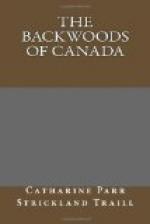Every settler grows, as an ornament in his garden, or should grow, hops, which form one of the principal components of maple-beer when added to the sap.
HOP-RISING
This excellent, and, I might add, indispensable, article in every settler’s house, is a valuable substitute for ale or beer-yeast, and is made in the following simple manner:—Take two double handfuls of hops, boil in a gallon of soft water, if you can get it, till the hops sink to the bottom of the vessel; make ready a batter formed by stirring a dessert-platefull of flour and cold water till smooth and pretty thick together; strain the hop-liquor while scalding hot into the vessel where your batter is mixed ready; let one person pour the hop-liquor while the other keeps stirring the batter. When cooled down to a gentle warmth, so that you can bear the finger well in it, add a cup or basinful of the former barm, or a bit of leaven, to set it to work; let the barm stand till it has worked well, then bottle and cork it. Set it by in a cellar or cool place if in summer, and in winter it is also the best place to keep it from freezing. Some persons add two or three mealy potatoes boiled and finely bruised, and it is a great improvement during the cool months of the year. Potatoes in bread may be introduced very advantageously; and to first settlers, who have all their flour to buy, I think it must be a saving.
The following method I found made more palatable and lighter bread than flour, mixed in the usual way:—Supposing I wanted to make up about a stone and half of flour, I boiled (having first pared them carefully)— say three dozen good-sized potatoes in about three quarts or a gallon of water, till the liquor had the appearance of a thin gruel, and the potatoes had become almost entirely incorporated with the water. With this potatoe-gruel the flour was mixed up, no water being required, unless by chance I had not enough of the mixture to moisten my flour sufficiently. The same process of kneading, fermenting with barm, &c., is pursued with the dough, as with other bread. In baking, it turns of a bright light brown, and is lighter than bread made after the common process, and therefore I consider the knowledge of it serviceable to the emigrant’s family.
SALT RISING.




